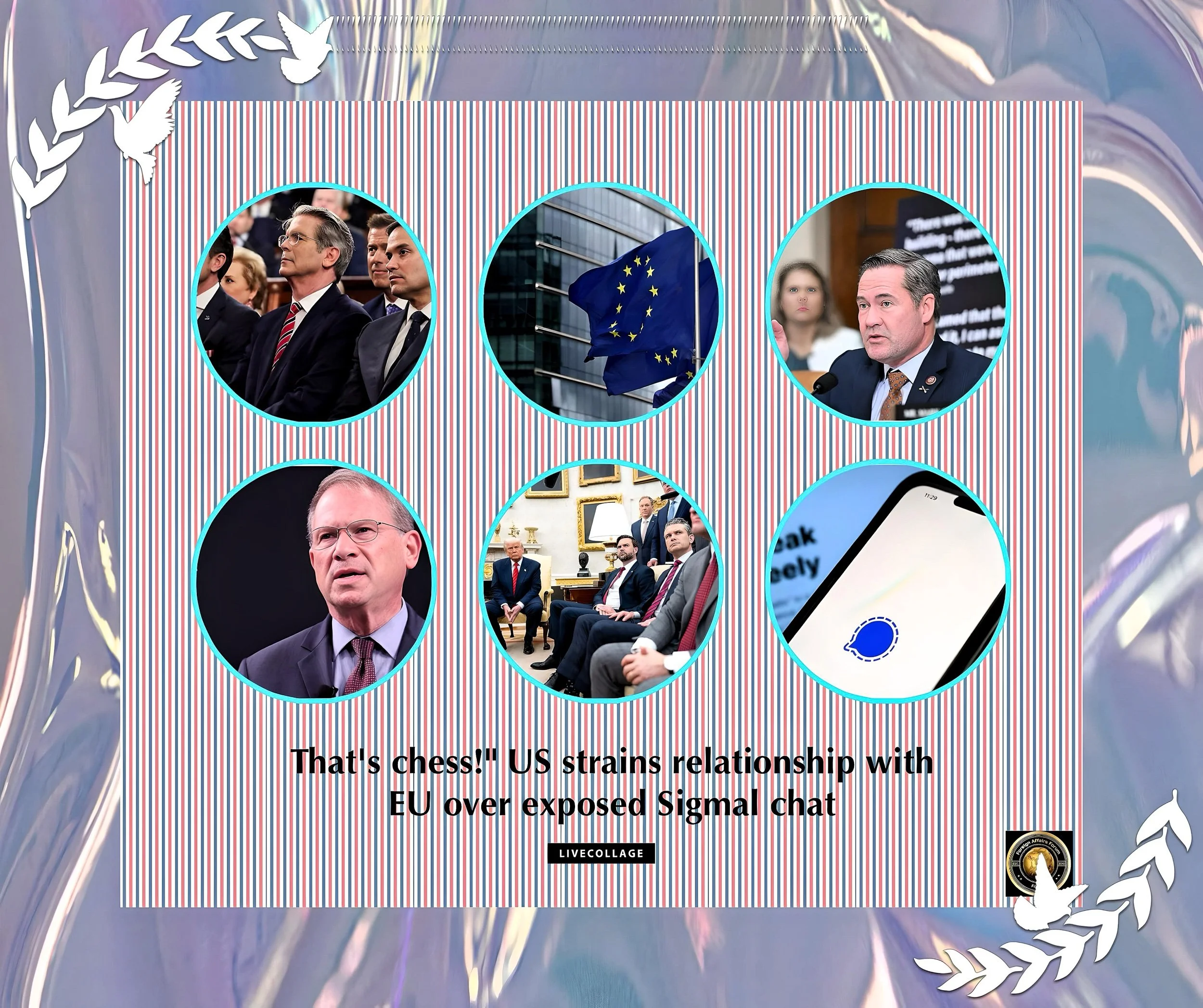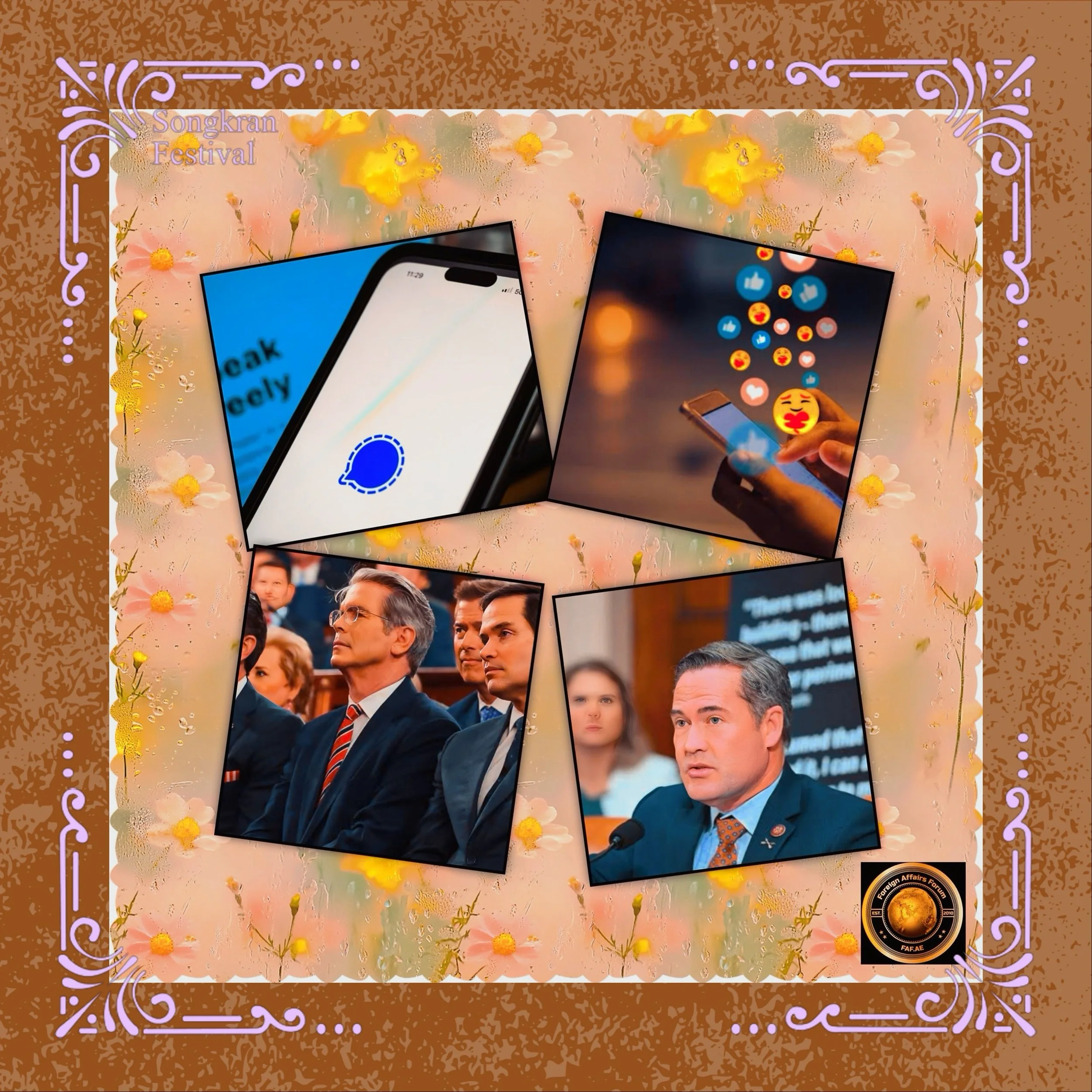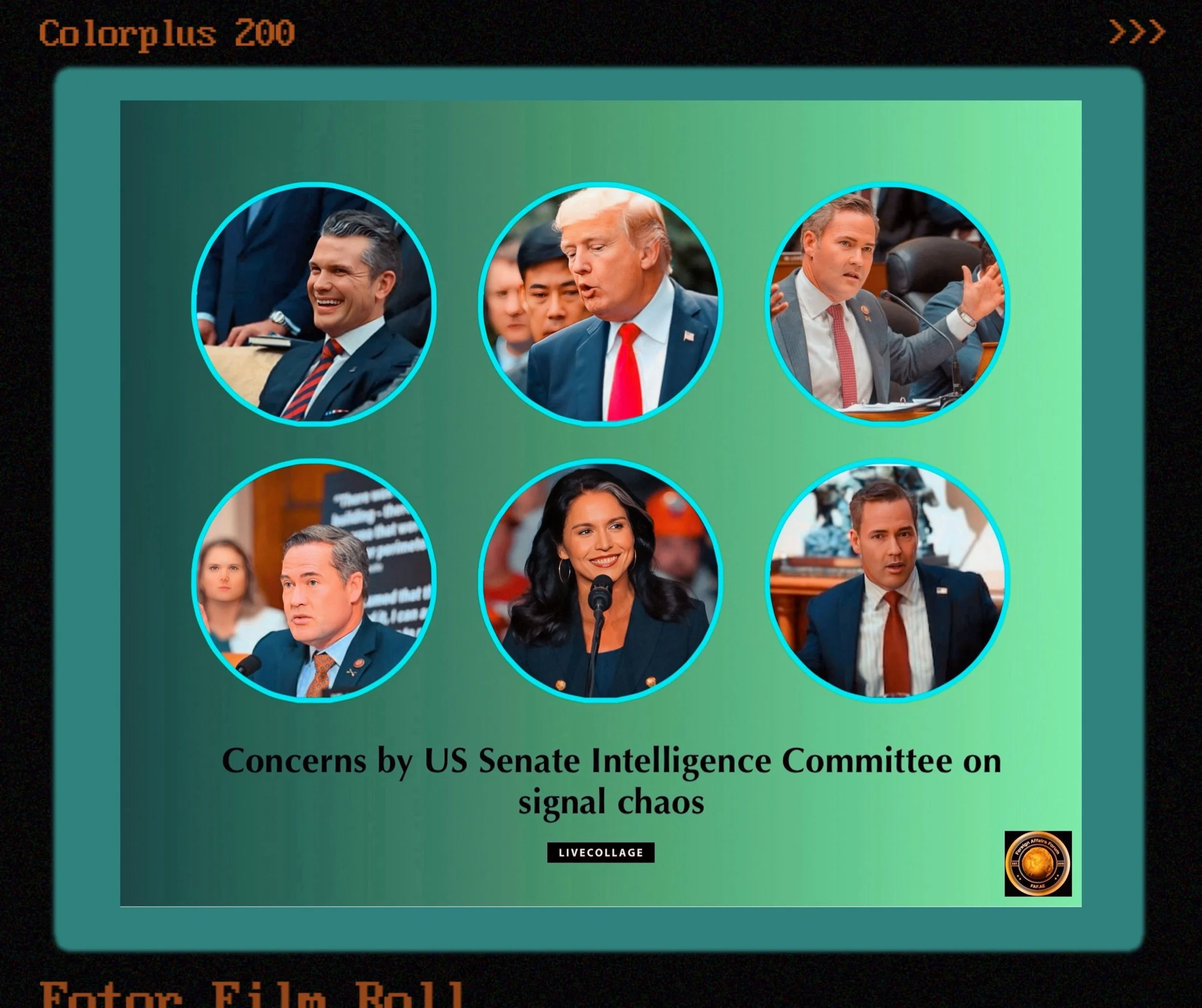Emoji’s tool of communication- Trump administration Z-Gen attitude- US-Europe Tensions Escalate - Signal Chat Leak Revealing “Pathetic European Free-loading” Comments
Introduction
A major diplomatic incident has unfolded between the United States and European allies following a Signal group chat leak where top Trump administration officials harshly criticized European partners while discussing sensitive military operations.
The leaked messages, which included emoji-laden communications about planned airstrikes in Yemen, have triggered a significant backlash and raised serious concerns about both diplomatic relations and national security protocols.
The Signal Leak: What Happened
On March 24, 2025, The Atlantic’s editor-in-chief, Jeffrey Goldberg, published a shocking revelation: he had been accidentally added to a high-level Signal group chat containing top Trump administration officials discussing sensitive military operations.
National Security Advisor Mike Waltz had inadvertently included Goldberg in an 18-person chat that was being used to coordinate U.S. responses to Houthi rebel attacks on shipping in the Red Sea.
The chat functioned as a strategic planning room for a March 15 airstrike in Yemen that resulted in over 50 casualties.
According to Goldberg’s report, Defense Secretary Pete Hegseth shared “operational details of forthcoming strikes on Yemen, including information about targets, weapons the U.S. would be deploying, and attack sequencing” just hours before the U.S. conducted the strikes.
The messages also discussed weapon shipments and the timeline for the Yemen strikes.
This high-level chat included Vice President JD Vance, Defense Secretary Pete Hegseth, National Security Advisor Mike Waltz, CIA Director John Ratcliffe, Director of National Intelligence Tulsi Gabbard, Secretary of State Marco Rubio, and Trump’s chief of staff Susie Wiles.
The National Security Council later confirmed that the messages “seem authentic” and indicated they investigated how Goldberg’s contact was included in the Signal group chat.
Anti-European Sentiments Exposed
Perhaps most diplomatically damaging were the harsh criticisms of European allies revealed in the leaked chat.
Vice President JD Vance expressed frustration about “bailing Europe out again” and questioned the necessity of U.S. involvement in protecting European trade interests.
Defense Secretary Pete Hegseth was particularly blunt, writing: “VP: I fully share your loathing of European free-loading. It’s PATHETIC”.
The officials specifically criticized the imbalance in trade reliance on the Suez Canal, noting that 40% of European trade passes through it compared to only 3% of U.S. trade.
This disparity was used to question why the U.S. should bear the military burden of protecting shipping routes that primarily benefit European economies.
The leak occurred shortly after Vice President Vance’s speech at the Munich Security Conference in Germany, where he had already articulated American criticism of Europe.
The incident has exacerbated existing strains in US-EU relations, adding to the tension. It comes amid an ongoing trade war initiated by President Trump’s 25% tariff on EU imports implemented in February 2025.
Emojis and Informality in High-Level Communications
One striking aspect of the leaked chat was the casual, emoji-laden nature of these high-stakes discussions about military operations.
National Security Advisor Mike Waltz used a combination of emojis - “a fist, an American flag, and fire” - when reacting to news about the airstrike.
This use of emojis in discussing serious military matters has drawn particular criticism.
Communication experts note that while emojis can enhance emotional expression in digital communications, their use in national security contexts raises concerns about professionalism and seriousness.
As one expert noted, “The Signal group chat leak highlights the vulnerabilities of mobile media-based group chat applications, which often fail to provide truly private and secure environments for discussions on any subject.”
Melvin Williams, a communication and media studies professor quoted in USA Today, observed that the emojis exchanged in this group chat reflect “a distinctly millennial approach to significant negotiations,” noting that for millennials and Generation Z—like the 40-year-old Vice President Vance—using group chats for important matters has become standard.
European Official Reactions
A mixture of public restraint and private horror has characterized the European response to the leaked chat.
Official Diplomatic Response
Most official European responses have been measured, with many officials speaking only on condition of anonymity to avoid further damaging transatlantic relations. A senior European diplomat described the situation as “terrifying to witness in stark terms. However, it’s hardly unexpected”.
European Union officials did not publicly request the planned US strikes in Yemen and have not discussed compensation with senior American policymakers, as suggested in the chat. European leaders have largely avoided making formal public statements, which analysts suggest is a strategic choice to prevent further deterioration of relations.
Behind-the-Scenes Sentiment
Despite the public restraint, the private sentiment among EU officials appears to be profound dismay. European leaders and policymakers reportedly felt “sick to the stomach” over the revelations. A European Union official told reporters that the leaked conversation had left European officials nauseous.
Nathalie Loiseau, a European Parliament member, responded with biting irony: “If I were Russian President Vladimir Putin, I would feel like I had nothing to do. Russia has no need to spy on the U.S. administration; they leak information on their own.”
Security and Intelligence Sharing Concerns
The breach has raised serious questions about future intelligence sharing and military cooperation between the US and its European allies.
Trust Deficit
A European diplomat indicated that this security lapse might lead allies to question the reliability of the United States as a partner. The diplomat hoped that the error was due to inexperience rather than a conscious neglect of security measures, but the damage to trust appears significant.
Security experts warn that this disregard for standard security protocols “will make allies very hesitant to share intelligence and analysis,” as noted by a former commander of US forces in Europe, who suggested that without significant change, people “will assume America cannot be trusted”.
Intelligence Community Response
The intelligence community on both sides of the Atlantic has expressed concern. British Armed Forces Minister Luke Pollard reassured UK lawmakers that British personnel were not endangered by the breach, stating, “We are confident that our security measures with our allies, including the United States, remain effective”. However, the incident has undoubtedly strained the Five Eyes intelligence-sharing alliance, which includes the US and UK.
Implications for Transatlantic Relations
The leaked chat represents more than just a momentary lapse in diplomatic courtesy—it signals potentially fundamental shifts in the historically strong US-Europe alliance.
Deteriorating Alliance
Many observers believe the leak exemplifies a deeper deterioration in transatlantic relations under the Trump administration. One analyst commented, “It is evident that the transatlantic relationship, as it once was, is finished, leaving only a sense of indifferent disdain”. Another noted there could be “a deliberate attempt to destabilize Europe”.
The European Union, which is founded on principles often at odds with those championed by the Trump administration—including rule-based international trade, climate regulation, and social media protections—now finds itself increasingly at odds with its traditional ally.
Trump Administration’s Response
President Donald Trump has attempted to downplay the incident, characterizing it as a minor “glitch” while defending his administration’s communication protocols.
During a telephone interview with NBC News, Trump specifically defended National Security Advisor Mike Waltz, stating, “Michael Waltz has learned a lesson, and he’s a good man.”
Despite calls for resignations, particularly for Defense Secretary Pete Hegseth and National Security Advisor Mike Waltz, the administration has primarily closed ranks.
White House press secretary Karoline Leavitt claimed no classified material was sent to the group chat and attacked Goldberg as “sensationalist.” This statement came a day after Defense Secretary Hegseth suggested the leak was a “hoax,” even as the White House confirmed the messages’ authenticity.
The administration’s response has done little to assuage concerns about information security practices and the diplomatic ramifications of the leaked anti-European sentiments.
Security and Legal Fallout
The leaked Signal chat has triggered significant security and legal repercussions for the Trump administration.
A Senate hearing was convened to grill Trump’s intelligence team over the breach, with top Democrats calling for the resignations of Defense Secretary Pete Hegseth and National Security Advisor Mike Waltz.
Senator Mark Warner, the intelligence committee's vice chairman, denounced what he called “sloppy, careless, incompetent behavior” by the intelligence officials who participated in the group chat. Democratic Leader Hakeem Jeffries described the leak on a non-classified system as “completely outrageous and shocks the conscience,” adding that it shows Americans are increasingly angry “due to the elevation of reckless and mediocre individuals, including the Secretary of Defense.”
The incident has also prompted legal action. On Tuesday, March 25, the watchdog organization American Oversight filed a lawsuit against Trump administration national security officials, alleging violations of the Federal Records Act.
The lawsuit references provisions of the Administrative Procedures Act and suggests that agency heads may have neglected their responsibilities regarding properly handling federal records.
Military experts have been particularly concerned about the operational security implications.
Michael Williams, a professor at Syracuse University, told Military.com: “There are people whose lives are literally on the line, whether that’s service personnel, whether that’s intelligence personnel… These guys are supposed to be leaders of the free world, the responsible leaders of the military, the greatest country in the world, and they can’t perform basic operational security”.
Diplomatic Implications for US-Europe Relations
The revelation of such explicit anti-European sentiments has raised serious concerns about the future of transatlantic cooperation and the potential long-term impact on diplomatic and security partnerships between the United States and its European allies.
The American Chamber of Commerce (AmCham) has warned of potential economic fallout from the deteriorating US-EU relations, exacerbated by this leak and ongoing trade tensions.
The incident occurred amid a trade war initiated by President Trump’s tariffs on EU imports, and diplomatic relations between the U.S. and Europe appear to be at a particularly low point.
As we await European responses, the revelation that high-ranking U.S. officials describe them as “pathetic freeloaders” will likely damage trust and cooperation on shared security challenges.
Conclusion
The Signal chat leak represents a perfect storm of diplomatic, security, and communication failures.
The Trump administration has created significant challenges on multiple fronts by revealing both anti-European sentiments and operational details of military actions through an insecure channel.
The incident highlights the risks of using consumer messaging apps for sensitive government business, the problems with informal communication styles in high-stakes contexts, and the fragility of international alliances when partners are openly disparaged in internal communications.
As investigations continue and diplomatic fallout spreads, this leak will likely have lasting consequences for U.S. security protocols and transatlantic relations.
The controversy also serves as a reminder of the changing nature of government communications in the digital age. The line between formal and informal channels has blurred, and even emoji usage can become a national security concern.




